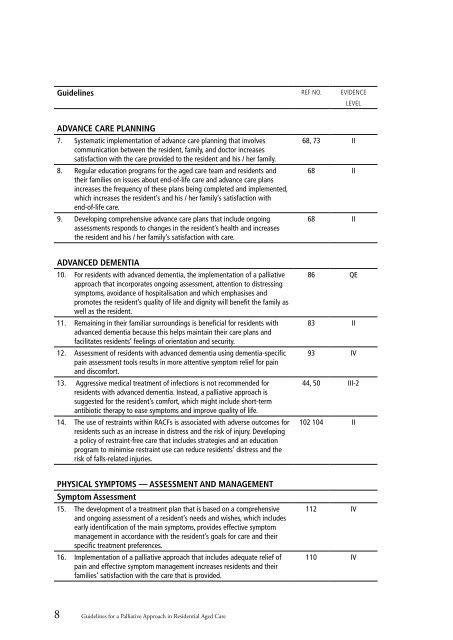Guidelines for a Palliative Approach in Residential Aged Care
Guidelines for a Palliative Approach in Residential Aged Care
Guidelines for a Palliative Approach in Residential Aged Care
Create successful ePaper yourself
Turn your PDF publications into a flip-book with our unique Google optimized e-Paper software.
<strong>Guidel<strong>in</strong>es</strong> Ref No. Evidence<br />
level<br />
ADVANCE CARE PLANNING<br />
7. Systematic implementation of advance care plann<strong>in</strong>g that <strong>in</strong>volves<br />
communication between the resident, family, and doctor <strong>in</strong>creases<br />
satisfaction with the care provided to the resident and his / her family.<br />
8. Regular education programs <strong>for</strong> the aged care team and residents and<br />
their families on issues about end-of-life care and advance care plans<br />
<strong>in</strong>creases the frequency of these plans be<strong>in</strong>g completed and implemented,<br />
which <strong>in</strong>creases the resident’s and his / her family’s satisfaction with<br />
end-of-life care.<br />
9. Develop<strong>in</strong>g comprehensive advance care plans that <strong>in</strong>clude ongo<strong>in</strong>g<br />
assessments responds to changes <strong>in</strong> the resident’s health and <strong>in</strong>creases<br />
the resident and his / her family’s satisfaction with care.<br />
68, 73 II<br />
68 II<br />
68 II<br />
ADVANCED DEMENTIA<br />
10. For residents with advanced dementia, the implementation of a palliative<br />
approach that <strong>in</strong>corporates ongo<strong>in</strong>g assessment, attention to distress<strong>in</strong>g<br />
symptoms, avoidance of hospitalisation and which emphasises and<br />
promotes the resident’s quality of life and dignity will benefit the family as<br />
well as the resident.<br />
11. Rema<strong>in</strong><strong>in</strong>g <strong>in</strong> their familiar surround<strong>in</strong>gs is beneficial <strong>for</strong> residents with<br />
advanced dementia because this helps ma<strong>in</strong>ta<strong>in</strong> their care plans and<br />
facilitates residents’ feel<strong>in</strong>gs of orientation and security.<br />
12. Assessment of residents with advanced dementia us<strong>in</strong>g dementia-specific<br />
pa<strong>in</strong> assessment tools results <strong>in</strong> more attentive symptom relief <strong>for</strong> pa<strong>in</strong><br />
and discom<strong>for</strong>t.<br />
13. Aggressive medical treatment of <strong>in</strong>fections is not recommended <strong>for</strong><br />
residents with advanced dementia. Instead, a palliative approach is<br />
suggested <strong>for</strong> the resident’s com<strong>for</strong>t, which might <strong>in</strong>clude short-term<br />
antibiotic therapy to ease symptoms and improve quality of life.<br />
14. The use of restra<strong>in</strong>ts with<strong>in</strong> RACFs is associated with adverse outcomes <strong>for</strong><br />
residents such as an <strong>in</strong>crease <strong>in</strong> distress and the risk of <strong>in</strong>jury. Develop<strong>in</strong>g<br />
a policy of restra<strong>in</strong>t-free care that <strong>in</strong>cludes strategies and an education<br />
program to m<strong>in</strong>imise restra<strong>in</strong>t use can reduce residents’ distress and the<br />
risk of falls-related <strong>in</strong>juries.<br />
86 QE<br />
83 II<br />
93 IV<br />
44, 50 III-2<br />
102 104 II<br />
PHYSICAL SYMPTOMS — ASSESSMENT AND MANAGEMENT<br />
Symptom Assessment<br />
15. The development of a treatment plan that is based on a comprehensive<br />
and ongo<strong>in</strong>g assessment of a resident’s needs and wishes, which <strong>in</strong>cludes<br />
early identification of the ma<strong>in</strong> symptoms, provides effective symptom<br />
management <strong>in</strong> accordance with the resident’s goals <strong>for</strong> care and their<br />
specific treatment preferences.<br />
16. Implementation of a palliative approach that <strong>in</strong>cludes adequate relief of<br />
pa<strong>in</strong> and effective symptom management <strong>in</strong>creases residents and their<br />
families’ satisfaction with the care that is provided.<br />
112 IV<br />
110 IV<br />
<br />
<strong>Guidel<strong>in</strong>es</strong> <strong>for</strong> a <strong>Palliative</strong> <strong>Approach</strong> <strong>in</strong> <strong>Residential</strong> <strong>Aged</strong> <strong>Care</strong>
















